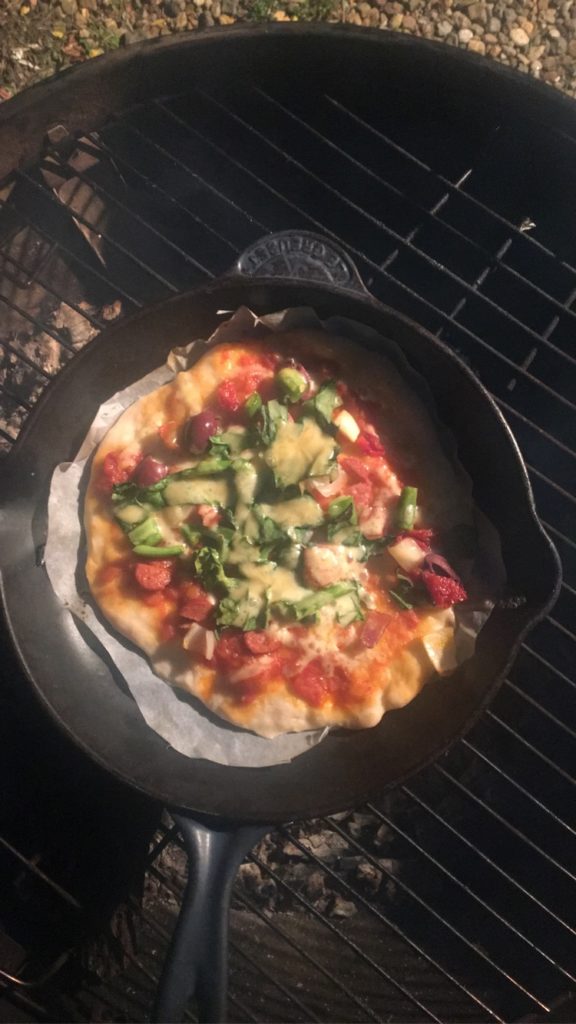Saturday, April 25: Sometimes when we asked my father what he’d done on a particular day, he’d reply, usually in jest: “Nothing, and I’ve been doing it very well.”
It kind of sums my day. I’ve done nothing, and I’ve done it very well. And I’m not joking.
It starts with purpose, at 6am. I walk out of the house to stand by the letterbox for the stay-at-home Anzac commemoration, and Anna and Guy step out from next door at the same time. Anna suggests we move down the hill to Bill’s memorial seat in our subdivision and stand beside that. We do, and it is a good thing. We are next to the seat and the feathery kowhai trees, and neighbours across the street are at their letterboxes with candles. We listen to the broadcast dawn service, the Last Post, and watch the pink lights of dawn streak the sky. There is dignity and poignancy in this small assembly. We walk home and have a cup of tea at a distance in my courtyard and then – to quote Dad – I kind of do nothing very well for the rest of the day. I talk to family and friends on the phone, walk to the local greengrocer, who is open again, read newspapers in the sun, do a few minor jobs, read my book.
I wear my Anzac poppy brooch today for my father, a World War II returned serviceman, and a genuinely good man. I think about him a lot, in lockdown, because he was a prisoner of war in Italy and Germany for two-and-a-half years. In Germany, particularly, he suffered great deprivation. Not that he ever complained about it, and he came home from Europe determined to make every day afterwards a good one. So in tough times in the past few weeks, I remember that my lockdown is, literally, a walk in the park compared with his. I have a comfortable home, plenty of food, wine, books, television, phone, internet, a great neighbourhood, nearby friends and family, and I can go for a walk (in a park) whenever I want to. So I think, surely I will manage this brief period of restraint.
My sister Margot and I ask ourselves during lockdown what Dad may have missed most during his POW years; what were the things he really wanted to do when he was released. We don’t know the answers to our questions because we never raised this with him. We thought we had all the time in the world to talk to Dad about his wartime experiences but he died too soon, he caught us unawares.
Venetia and I visited my father’s first prison camp, in Abruzzo, Italy, a few years ago on holiday, and we got a small insight into the spartan life he would have led, the freezing concrete huts the prisoners slept in, the forbidding watch towers and barricades that ringed the camp. Later, we climbed the hill above and looked down on the old prison – situated in a beautiful, serene valley – where thousands of Allied soldiers were held. We made friends with Italians whose forbears had been my father’s foes. The irony of this was ever-present.
Food matters: dinner is pizza from the backyard next door, the work of talented great-niece Emme. She makes the dough and cooks the pizzas on a cranked up charcoal barbecue which tonight doubles as a pizza oven. It’s the first time the family tries this: a cast-iron frying pan is lined with baking paper, and individual pizzas – topped with lovely fresh ingredients devised by Emme – are baked in the pan, on the barbecue, lid on, for a few minutes a pop. They’re hot and tasty, with crispy bases and lovely smoky flavours. Better than a bought one, and a perfect end to this memorable Anzac Day.
Kia hora te marino | May calm be spread around you


One reply on “Day 36”
The visit to Campo 78, near Sulmona, was a powerful reminder of the brutality and deprivation of war. It was a privilege to walk with you in the footsteps of your father, Denise, knowing that he survived and passed on his huge positivity to his daughters.